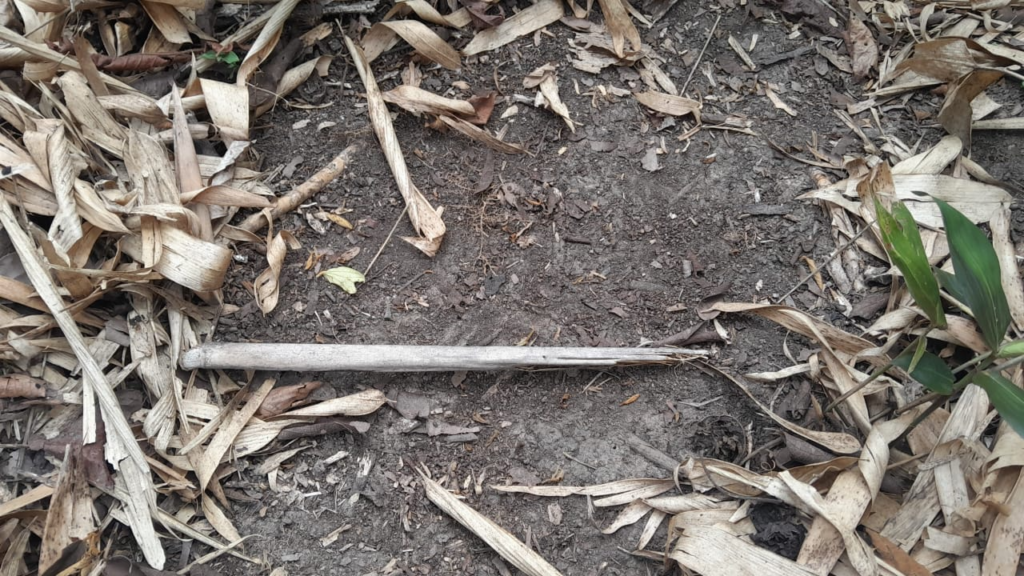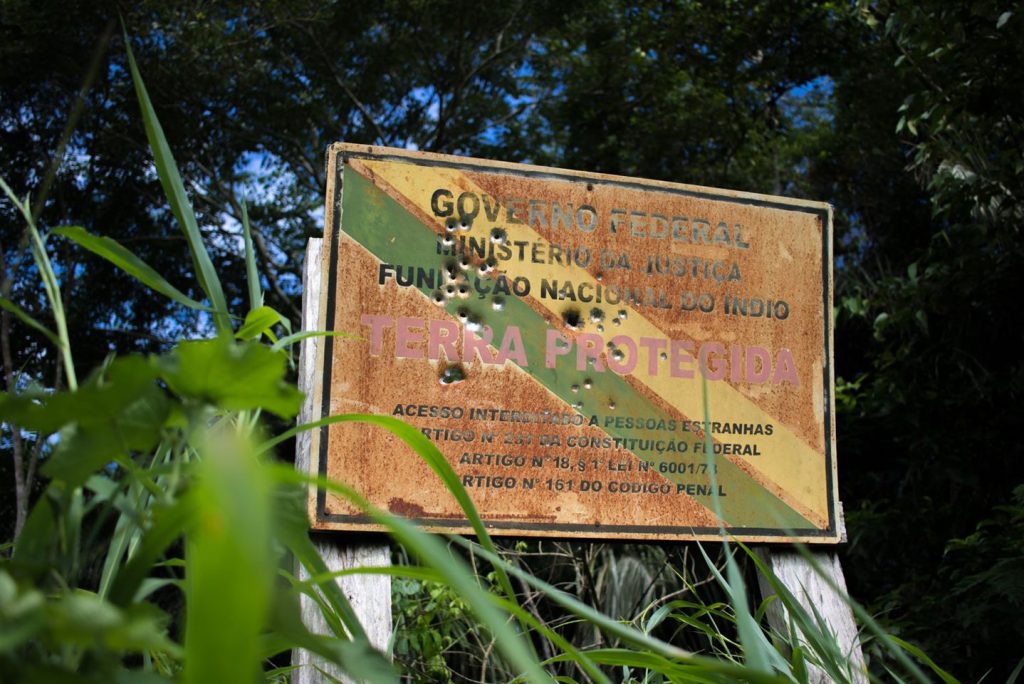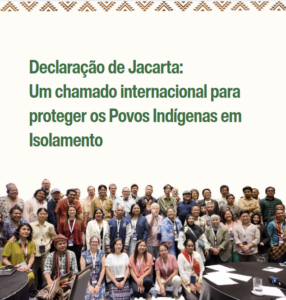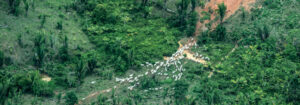In an open letter, the peoples who are the front line in the defence of isolated groups explain the urgency of the situation to Funai
The Manchineri of the Mamoadate Indigenous Territory and the Huni Kuĩ of the Kaxinawá Indigenous Territory of the Humaitá River, who work with monitoring and territorial surveillance and in defense of the rights of the isolated peoples with whom they share their territories, are increasingly mobilised in search of effective public policies, as well as strengthening the work they do in their villages in the state of Acre. Their leaders have been demanding Funai's Ethno-Environmental Protection Bases for over ten years. In an open letter to the National Foundation for Indigenous Peoples (FUNAI), dated 21 November 2023, leaders of the Manchineri people, represented by the MAPPHA Association (Manxinerune Ptohi Phunputuru Poktshi Hajene), call for the installation of a Bape (Ethno-Environmental Protection Base) in the Extrema village, in the Mamoadate Indigenous Land.
MAPPHA's statement points out that, "as well as strengthening the work being carried out by indigenous monitors and Funai officials, the Bape will ensure the physical and territorial integrity of the isolated people and the Manchineri and Jaminawa, threatened by the illegal activities taking place in the Acre-Peru border region, such as logging, drug trafficking and the actions of religious fundamentalists, and in the event of an unexpected contact situation."
The Bapes are managed by the Ethno-Environmental Protection Fronts (FPE), which are responsible for localisation, monitoring and territorial protection in Indigenous Lands where isolated peoples are present.
The Manchineri have been monitoring their relatives or the isolated, even before their lands were demarcated, and since 2011 this work has been recognised by FUNAI and partner institutions. Since then, there has been a request to build a Funai Protection Base, or Bape, in the Alto Iaco region, where the isolated people are known to transit. It was even discussed in the Territorial and Environmental Management Plan for the Mamoadate Indigenous Land that this area is for the exclusive use of the isolated groups that inhabit the region bordering Peru.
There have been increasing reports of the isolated groups moving closer to the Extrema and Lago Novo villages over the last three years, whose inhabitants have even been avoiding hunting grounds due to their proximity. At the beginning of November, residents of Lago Novo village also reported finding traces of the ‘desconfiados’ near their homes. At the end of the month, cacique Alberico heard the murmur of the ‘desconfiados’* near the village of Extrema, and observed their traces and the stealing of bananas from his plot.
On 11th December, teacher Josimar also recorded the presence of the isolated in his plot near the village of Extrema. The trace was recorded by the FPE's team of ethno-environmental protection agents.
The Manchineri also refer to their isolated relatives as Yine Hosha Hajene, and due to the emergency situation in the region, they are formulating, together with the Yine of Peru, strategies for dealing with possible contact situations and contingency plans for the community itself. For this reason, they are also asking for support from state institutions and civil society allies for the construction of "Protection Houses" in the Extrema and Lago Novo villages, in order to shelter residents in the event of emergency situations in the communities.
For the protection of the "hairy" isolated of Humaitá
The Huni Kuĩ from the villages of the Kaxinawá do Rio Humaitá Indigenous Land, who share their territory with the "hairy" isolated peoples of Humaitá, also spoke out in a letter sent to FUNAI on 29 October 2023. According to the letter, the Huni Kuĩ have noticed an increase in the presence of the isolated in their communities, putting children, old people and women at risk, etc. "In addition to the displacement of the isolated, we are suffering threats from hunters and fishermen, close to where the isolated are known to be."
The indigenous people of the Humaitá River are a reference in the work of territorial monitoring and protection of indigenous peoples in isolation, and since 2014 they have been demanding the installation of a Bape in the region, because despite the vigilance carried out by the Huni Kuĩ, it is not possible to monitor all the threatened areas in their territory without state resources. In addition, the Kaxinawá do Rio Humaitá Indigenous Land, is a territory where isolated peoples transit, and sightings are getting closer and closer to the villages. During 2023 there were several thefts in the Huni Kuĩ villages, as well as the discovery of traces and artefacts from the isolated peoples. On 19 November, a member of the indigenous community, Maria Hilda, took photos of the place where the isolated people slept near her village Novo Futuro.
Renewal of FPE Envira's temporary contracts
At the end of 2021, Manchineri and Huni Kuĩ indigenous people from the monitoring and surveillance teams of their peoples indigenous lands were hired as temporary employees of FUNAI's Envira FPE, as determined by the Supreme Court in ADPF 709 (Argument for Non-Compliance with a Fundamental Precept), which obliged the Brazilian government to adopt immediate measures to contain the spread of the Covid-19 pandemic among Brazil's indigenous peoples. Health barriers and Access Control Posts* were set up in the Mamoadate and Kaxinawá Indigenous Lands on the Humaitá River.
In a letter dated 28th October 2023, the indigenous protection agents who work at FPE Envira, in the Kaxinawá do Rio Humaitá Indigenous Land, also requested that state agencies look at the importance of setting up Access Control Posts on indigenous lands, under the policy of protecting isolated peoples and for monitoring the entry and exit of people into and out of indigenous land, avoiding invasions by illegal hunters and fishermen, loggers who threaten the well-being of the isolated people who frequently pass through our territory." The main demand of this letter is to extend the temporary contracts of the indigenous Protection Agents. They point out that not renewing the contracts of the health barrier workers will cause setbacks in the protection policy for the isolated peoples who live in the Humaitá River region.
*Relatives: Indigenous peoples use the term to refer to all other indigenous peoples who they regard as their kin. *Desconfiados: Translates as suspicious: it is how indigenous peoples refer to their relatives who avoid contact because they don’t trust anyone.




